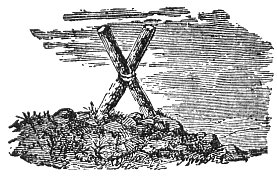The history of Masonry is the history of Philosophy. Masons do not pretend to set themselves up for instructors of the human race: but, though Asia produced and preserved the Mysteries, Masonry has, in Europe and America, given regularity to their doctrines, spirit, and action, and developed the moral advantages which mankind may reap from them. More consistent, and more simple in its mode of procedure, it has put an end to the vast allegorical pantheon of ancient mythologies, and itself become a science.
None can deny that Christ taught a lofty morality. “Love one another: forgive those that despitefully use you and persecute you: be pure of heart, meek, humble, contented: lay not up riches on earth, but in Heaven: submit to the powers lawfully over you: become like these little children, or ye cannot be saved, for of such is the Kingdom of Heaven: forgive the repentant; and cast no stone at the sinner, if you too have sinned: do unto others as ye would have others do unto you:” such, and not abstruse questions of theology, were His simple and sublime teachings.
The early Christians followed in His footsteps. The first preachers of the faith had no thought of domination. Entirely animated by His saying, that he among them should be first, who should serve with the greatest devotion, they were humble, modest, and charitable, and they knew how to communicate this spirit of the inner man to the churches under their direction. These churches were at first but spontaneous meetings of all Christians inhabiting the same locality. A pure and severe morality, mingled with religious enthusiasm, was the characteristic of each, and excited the admiration even of their persecutors. Everything was
p. 541
in common among them; their property, their joys, and their sorrows. In the silence of night they met for instruction and to pray together. Their love-feasts, or fraternal repasts, ended these reunions, in which all differences in social position and rank were effaced in the presence of a paternal Divinity. Their sole object was to make men better, by bringing them back to a simple worship, of which universal morality was the basis; and to end those numerous and cruel sacrifices which everywhere inundated with blood the altars of the gods. Thus did Christianity reform the world, and obey the teachings of its founder. It gave to woman her proper rank and influence; it regulated domestic life; and by admitting the slaves to the love-feasts, it by degrees raised them above that oppression under which half of mankind had groaned for ages.
This, in its purity, as taught by Christ Himself, was the true primitive religion, as communicated by God to the Patriarchs. It was no new religion, but the reproduction of the oldest of all; and its true and perfect morality is the morality of Masonry, as is the morality of every creed of antiquity.
In the early days of Christianity, there was an initiation like those of the pagans. Persons were admitted on special conditions only. To arrive at a complete knowledge of the doctrine, they had to pass three degrees of instruction. The initiates were consequently divided into three classes; the first, Auditors, the second, Catechumens, and the third, the Faithful. The Auditors were a sort of novices, who were prepared by certain ceremonies and certain instruction to receive the dogmas of Christianity. A portion of these dogmas was made known to the Catechumens; who, after particular purifications, received baptism, or the initiation of the theogenesis (divine generation); but in the grand mysteries of that religion, the incarnation, nativity, passion, and resurrection of Christ, none were initiated but the Faithful. These doctrines, and the celebration of the Holy Sacraments, particularly the Eucharist, were kept with profound secrecy. These Mysteries were divided into two parts; the first styled the Mass of the Catechumens; the second, the Mass of the Faithful. The celebration of the Mysteries of Mithras was also styled a mass; and the ceremonies used were the same. There were found all the sacraments of the Catholic Church, even the breath of confirmation. The Priest of Mithras promised the Initiates deliverance from sin, by means
p. 542

Moe is the founder of GnosticWarrior.com. He is a father, husband, author, martial arts black belt, and an expert in Gnosticism, the occult, and esotericism.





